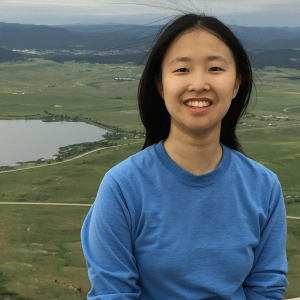Shortly after incoming physics graduate student Winnie Wang attended a UW–Madison campus visit weekend in February, her plans took an abrupt change due to COVID-19. The University of Massachusetts, where she was studying, closed right before spring break, and she decided to go to Taipei to be with extended family. But first, she needed to follow the regulations in Taiwan and self-isolate for 14 days.
“I chose to be quarantined in a hotel, so I was by myself for two weeks. It was honestly kind of brutal, and for the first five days I was feeling pretty miserable,” Wang recalls. “I’m putting it bluntly, because that misery was what inspired me to do something about it. I was like, ‘Okay, well, why don’t I proactively use some of my free time.’”

Wang, who is from Canada and attended school in the U.S., watched what was happening to the case numbers in those two countries, especially compared to the relatively lower numbers in Taiwan, and started looking for ways to get involved. She posted on Facebook asking if anyone knew groups she could volunteer with, and eventually landed on a group called N95DECON.
According to the group’s website, N95DECON is a volunteer collective of scientists, engineers, clinicians, and students from universities across the U.S. as well as other professionals in the private sector. N95DECON seeks to review, collate, publish, and disseminate scientific information about N95 decontamination to help inform decisions about N95 decontamination and reuse.
“Hospitals use a lot of N95s, and you’ve probably heard of things where people have put masks in microwaves or rice cookers to decontaminate them. And basically, you don’t want to do that,” Wang says. “We looked at the research that’s already out there, looked at what the CDC recommends, and we culminated our findings into papers and seminars for hospitals to use around the world.”
Wang serves as a communications volunteer for the group, meaning she responds to emails and proofreads and edits the group’s publications. She says that when she first started, N95DECON did not have much in the way of formal documentation, so much of her early efforts were spent answering emails from the public asking about reuse procedures. But knowing that N95s were in short supply and time was of the essence, N95DECON worked quickly to put together online seminars that could be viewed by anyone.
“After we organized and recorded the seminars in May and put them on our website so that anyone can watch them, the email team received less email from the general public,” Wang says. “And I’ve moved on now to more literature review.”
N95DECON shared their work largely through the hospital networks of the health professionals that volunteer with the group, as well as through social media and other word-of-mouth. The group will continue to monitor research on best practices for decontaminating and reusing N95 masks and update their recommendations accordingly. Much of their current efforts are focused on translating their papers and seminars.
“We’d have people from all over the world join our seminars and talk about their experiences,” Wang says. “So, another aspect of our outreach is that we do translations. Our goal is to disperse this information around the world, and we’ve translated it into seven languages now.”
Wang plans to continue volunteering with N95DECON after the UW–Madison academic year begins. She is interested in studying experimental high energy physics for her doctorate.